Today marks the 104th anniversary of the Battle of Jutland, the climactic naval clash of the First World War. This is a topic I've discussed at some length already, so it's worth turning our attention to the background the battle was fought against, the British blockade of Germany.
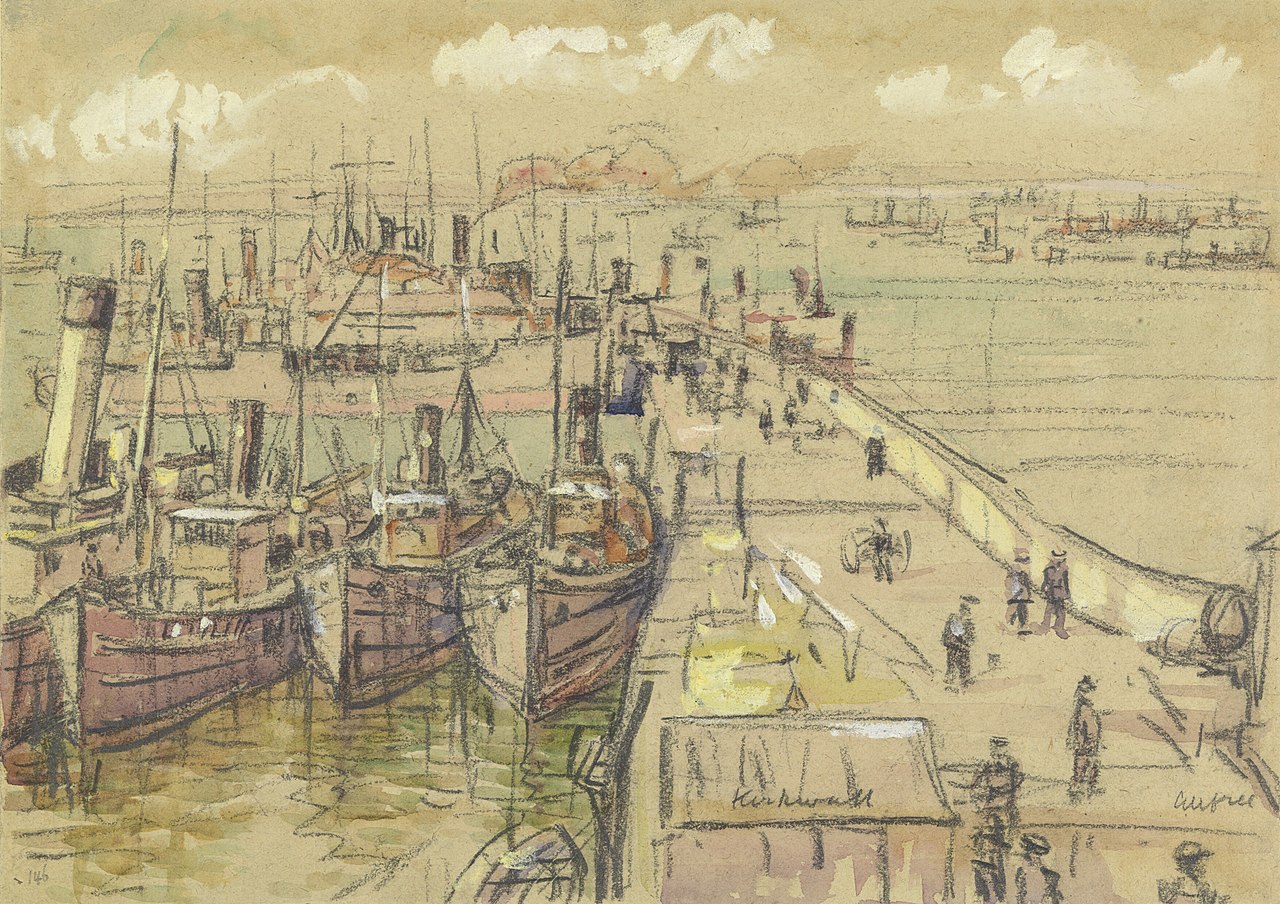
The headquarters of the Northern Patrol, who enforced the blockade
While most think of globalization as an inherently modern phenomenon, it was almost as prevalent in the first decade of the 20th century as it was in the first decade of the 21st. Britain and Germany were two of the leading players in the new global economy, deeply tied into international trade. Britain got over half of its food from overseas, while Germany imported a quarter, to say nothing of the essentials necessary to sustain an industrial economy. Each rightly deduced that the other was vulnerable to attacks on its commerce, although they set about it in very different ways. Germany, knowing that it was outmatched at sea, planned a classic guerre de course based on commerce raiding by converted merchant ships and cruisers. This ultimately failed in the face of British innovations in Command and Control, forcing them to switch to submarines for their attacks on British commerce.
The British efforts were more successful, using their command of the sea to cut off German shipping much more thoroughly. The concept of blockade in international law had a long history, and had been used by the British numerous times over the centuries, most often against the French. The traditional and legal blockade was the so-called "close blockade", conducted within sight of the enemy's ports. The British had planned to conduct this kind of blockade as late as 1911, but the development of the torpedo, and the resultant threat from destroyers and submarines pushed them to a new concept, the distant blockade. Instead of stationing their fleet just off the German coast, as the Germans themselves expected and wanted, they would instead attempt to control all shipping moving into or out of the North Sea. While this would leave German trade with Scandinavia more or less unimpeded, it would still allow them to cut German ties to the rest of the world, hopefully shortening the war.
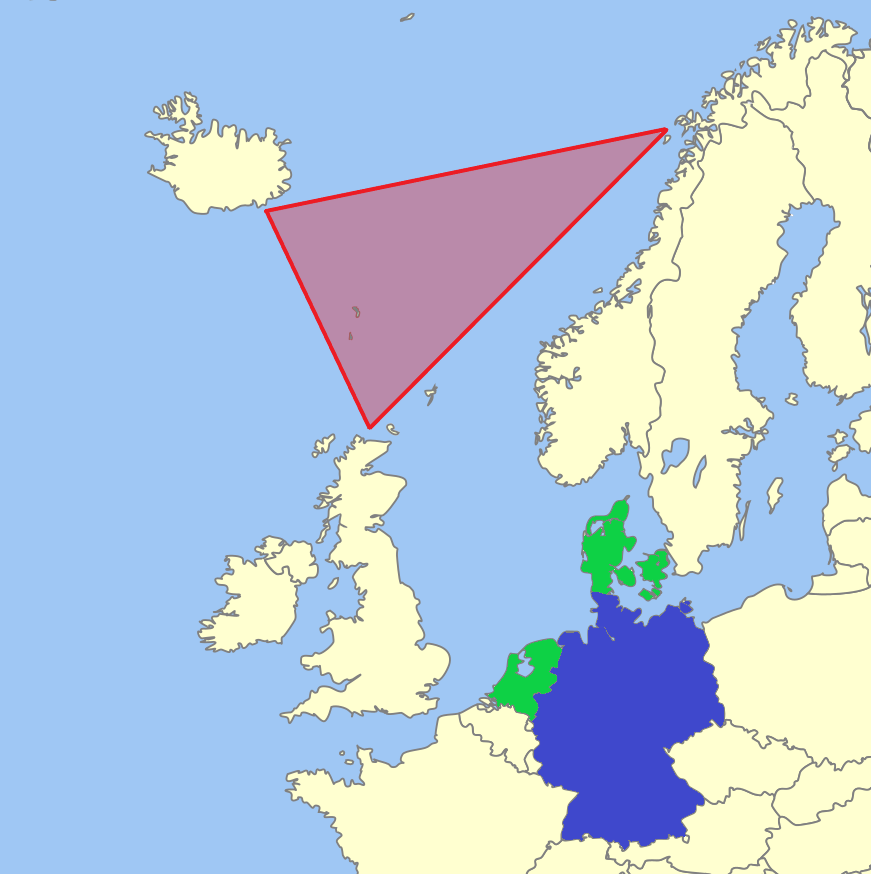
The patrol area (in red) with Germany in blue and neutral transshipment countries in green
There were a couple of major problems, though. First, under existing international law, this plan was on shaky ground. The distant blockade wasn't really legal under existing treaties, although the British hadn't actually signed all of them. On the high seas, the British could only prevent the passage of "contraband", which had a complicated definition, but wasn't supposed to cover everything all of the time. Food, for instance, was supposed to be contraband only when it was consigned to the military. Second, neutral countries often objected. The Netherlands and Denmark both provided potential points for transshipment of goods to Germany, and it ultimately took the British several years to find a good way to make sure their populations didn't starve while limiting how much could get to Germany. On the other hand, the US was a major German trading partner, as well as home to a large block of German-Americans who were still sympathetic to their homeland. To avoid unduly antagonizing the US, the British had to significantly weaken the blockade they had planned, and it wasn't fully effective until the US joined the war, cutting the major source of overseas trade off at the source.
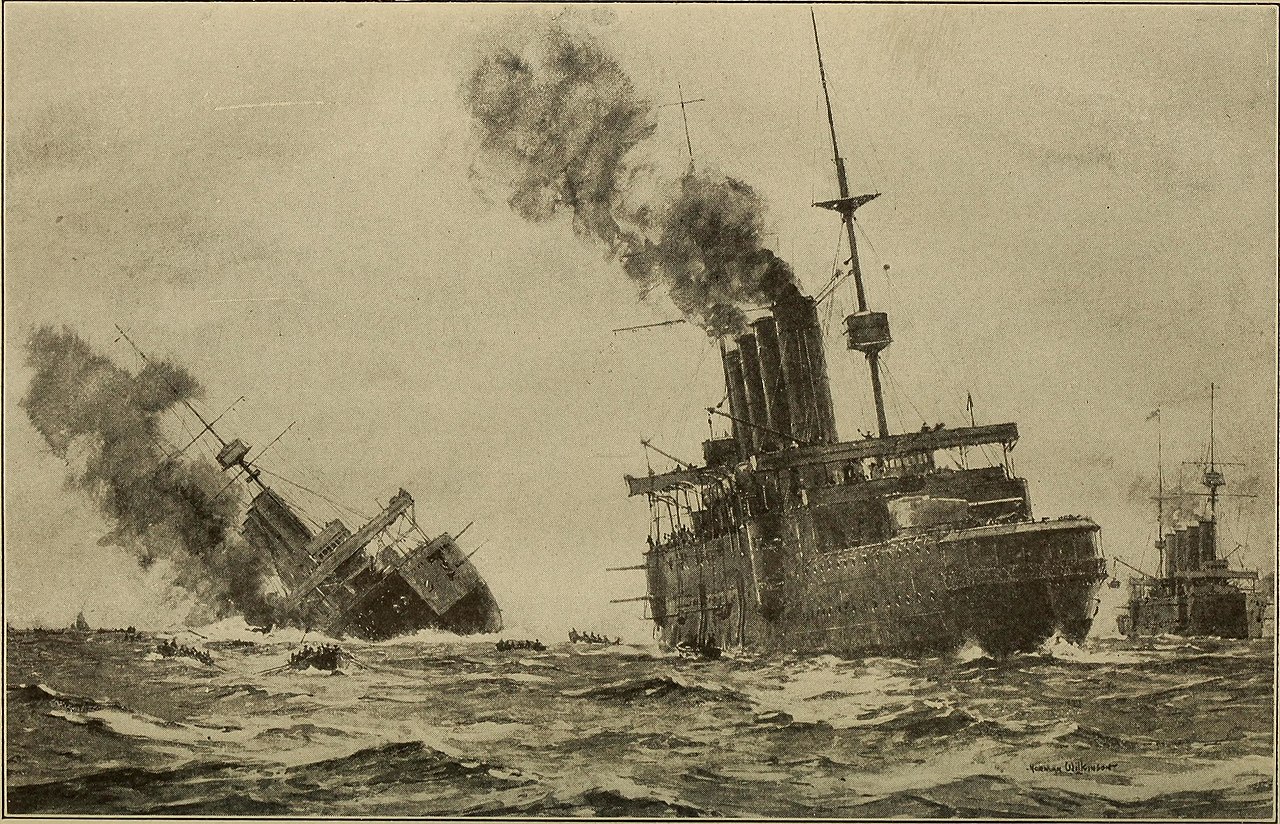
Elderly cruiser Aboukir, sunk by a U-boat while attempting to enforce the blockade
Initially, the blockade was enforced by the 10th Cruiser Squadron, made up of older protected cruisers, but these proved to be unequal to the task of staying at sea in all weathers, and were soon replaced with a variety of converted liners and fast cargo ships, mostly armed with 6" guns. These were responsible for finding and hailing any potential blockade runners. If boarding was needed, a smaller vessel, usually a converted ferry or the like, would be called in to actually put the party aboard. This was the result of painful experience, which had taught them that large vessels could not heave to and send over boarding parties in submarine-infested waters.
Initially, the blockade was fairly porous. It was impossible to cut off all supplies to Germany via neutral countries, if nothing else because the British didn't have a good grasp on the internal requirements of the neutrals, and commercial interests on both sides of the Atlantic wanted to continue prewar trade, particularly in the early days of the war. Eventually, the British overcame most of these problems, as the reality of total war sank in at home, and they came to agreements with the Danish and Dutch governments over how much they would be allowed to import.
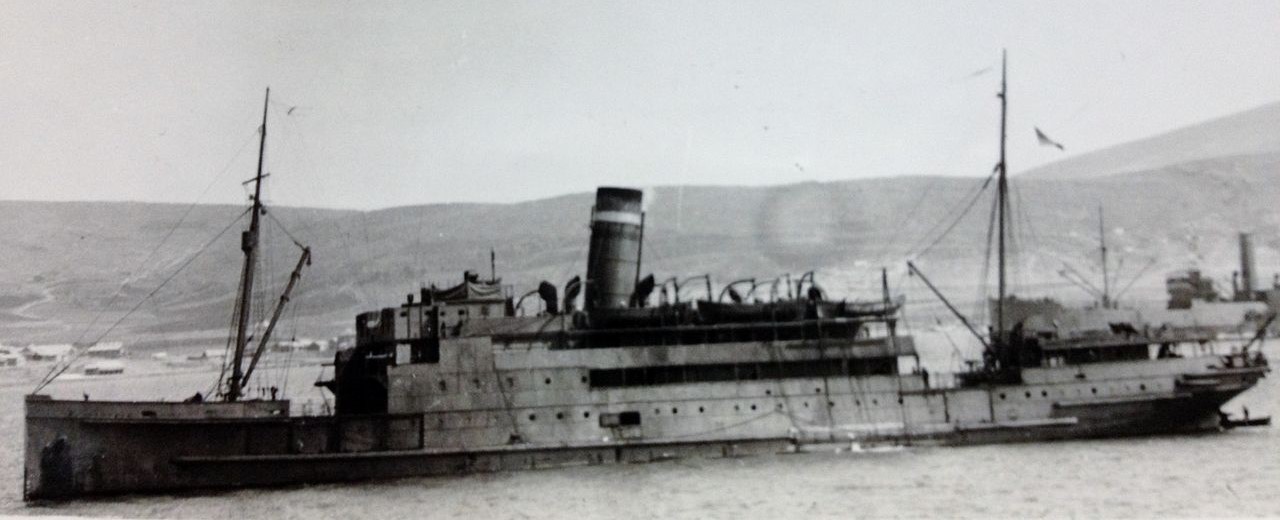
Armed Boarding Vessel Snaefell
Despite these limitations, the blockade was effective in cutting Germany off from the world's resources. Many important alloying elements were now unavailable, although German metallurgists found workarounds at a cost in durability. If war had come even five years sooner, the lack of nitrates, vital for both explosives and fertilizer, might well have crippled Germany within a year. The development of the Haber process, which could fix atmospheric nitrogen into ammonia, had removed this restriction, but it was expensive, and the Germans faced chronic fertilizer shortages, exacerbating the food restrictions imposed by the blockade directly. Things came to a head in late 1916, when a poor potato harvest and distribution problems, partially caused by a lack of lubricants due to the blockade, left Germany seriously short on food, forcing the population to subsist largely on rutabagas, usually raised as animal feed, over the exceptionally harsh winter of 1916-1917. This time, known as the Turnip Winter, saw mass malnutrition, as the daily rations fell to half the calories required by the population, and bread was made with sawdust to stretch it further. The death rate among civilians soared, and unrest spread among both civilians and soldiers. The desire for revenge against the British was an important factor in the resumption of the unrestricted submarine warfare campaign that ultimately brought the US into the war.
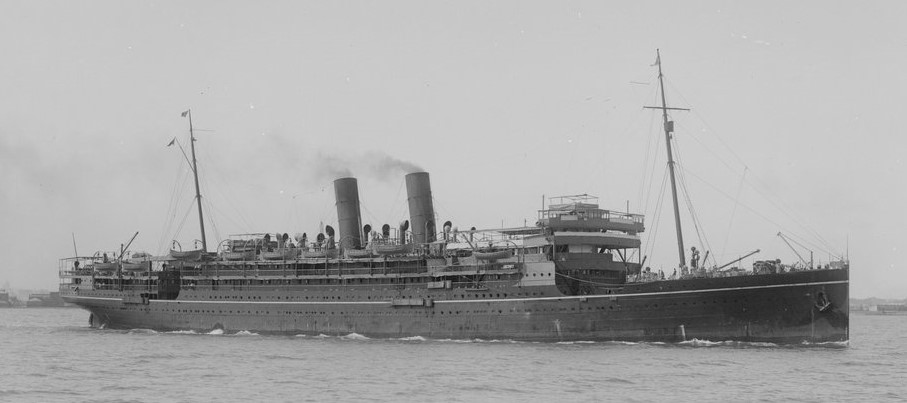
Armed Merchant Cruiser Mantua
Things improved somewhat in 1917, as German agriculture recovered and Russia's collapse raised civilian morale, but it was only a temporary matter. The submarine campaign failed in its promised aim of knocking Britain out of the war, and unrest about the privations of the blockade began to spill over into political demonstrations, both in German cities and the High Seas Fleet. These died off as the harvests came in that fall, but resumed in January, when broad strikes swept across first Austria-Hungary and then Germany before fading as hunger drove the strikers back to work.
Things came to a head in the summer, as the German offensive broke on the Allied armies and the Allied armies struck back, pushing the Germans back from lines they had held for four years. This was the last straw for the German populace, who had been called on to endure horrible conditions in the hope of victory. As that hope was destroyed by Allied arms, revolution swept the nation, and the Kaiser's government came crashing down. The blockade wasn't solely the responsible for all of this, but its direct effects on the German war machine, and its indirect effects on the German population should not be underestimated. The Allies certainly didn't, maintaining it in a slightly reduced form until the Treaty of Versailles was signed, to prevent Germany from reopening hostilities.
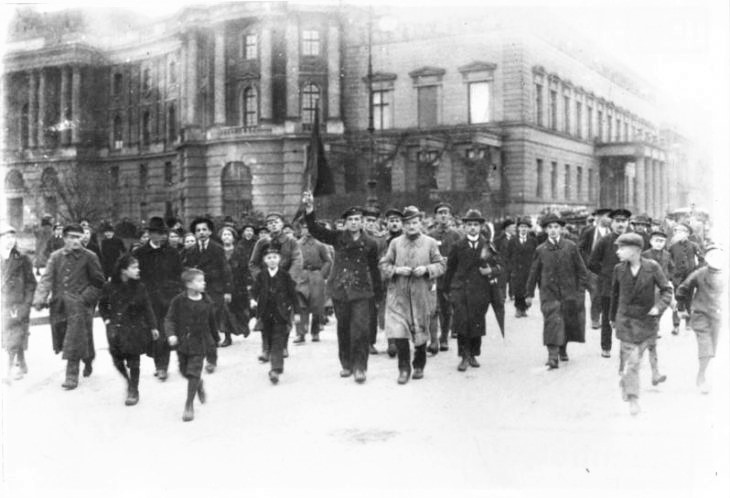
Germans strike in 1918
In many ways, Jutland was the linchpin of all of this, as the Grand Fleet made any attempt to snap up the AMCs that actually enforced the blockade incredibly risky. The British realized the importance of the blockade, and as Churchill famously observed, Jellicoe was the only man who could have lost the war in an afternoon. If the Grand Fleet had lost the battle, then the integrity of the blockade would have been compromised, reducing the constriction on Germany's arteries, and greatly increasing the chances of a German raider slipping through to menace Britain's commerce. But all of this, and the vital role that seapower played in the Allied victory over the Central Powers, was lost to public perception, overwhelmed by the images of the trenches. Fortunately, recent years have seen a broader appreciation for the work of those outside the Western Front, most prominently the sailors who starved Germany.

Comments
Dutch neutrality in WW1 is an interesting story. AFAIK the export restrictions, in the early part of the war, were organised by a group of businessmen- the Netherlands Overseas Trust- which officially was completely independent of the Dutch government.
It was, after all, not easy to stay neutral
(Vaguely naval-related Dutch postcard from WW1, contains pictures of women in 1910s swimsuits but probably still SFW. The sailor is wearing a Dutch Navy uniform.)
I wonder how bad the defeat would have had to have been. E.g. assuming the Grand Fleet had been reduced to parity with the High Seas Fleet, would that have rendered the blockade untenable? What about unrestricted U-boat warfare, and thus US entry into the war?
I'd guess that a seriously weakened Grand Fleet would mean more caution in the patrols, which in turn raises the odds of the Germans slipping raiders out. Not a wholesale "the blockade is done", but you probably would be more cautious about when it was in operation. And if they can do that, it significantly lowers the odds they go with unrestricted submarine warfare, which almost takes war with the US off the table. Also, if the blockade becomes potentially "ineffective", the US business community is likely to want to resume trade with Germany, which pushes them further away from the Allies.
That's my read as well. The major factor pushing for Unrestricted Submarine Warfare was the domestic political reaction in Germany to the effects of the British blockade. The idea was that by striking back in kind at Britain by imposing a submarine blockade, the German government could demonstrate to the people that it was avenging their misery on the enemy. Weaken the British blockade of Germany, and that political pressure weakens as well. Especially if the weakening of the blockade can reasonably be attributed to some martial triumph by the German navy.
The requirement to have auxiliary warships on essentially constant patrol to enforce the blockade, cedes a great deal of initiative to the Germans. They can send regular cruisers to conduct reconnaissance in force at a time of their choosing, covered them with a High Seas Fleet that is actually at sea while the Grand Fleet is probably in port. If the British withdraw their blockading ships at the first sign of danger, the blockade is ineffective. If they keep the blockade in place, they start losing AMCs in a hurry. If they sortie the Grand Fleet, they risk sailing into an ambush by a superior foe. If they no longer have the option of sailing to meet the Germans with a superior fleet, they don't have any good options at all.
Probably the least-bad option would be to maintain the blockade, sortie the Grand Fleet as needed, and hope the inevitable Second Jutland breaks in their favor despite the force balance less favorable than it was the first time.
I'm not actually sure it would be that bad, now that I think about it more. First, there's Fisher's tracking system, which should let them use the AMCs more as interceptors than as a patrol line. Yes, there will be more leakage, although quite a bit less than there would be if the blockade collapsed completely. Second, there's Room 40 and the DF teams, who can do a pretty reasonable job of alerting the Admiralty to when the Germans are sailing. Call the AMCs in and send the fleet out. The bigger effect is probably on the diplomatic front. If the Germans don't unleash the U-boats, the US sits it out, and goodness knows what happens after that.
Wasn't Fisher's tracking system designed primarily to hunt down surface raiders? Merchants would be less conspicuous, use multiple false identities under multiple false flags etc.
I can see 3 direct consequences if the RN loses superiority in the North Sea: it weakens the blockade of Germany, it allows German raiders easier access to the North Atlantic, and it cuts off Russia almost completely.
The British still sit astride German trade routes, they can defend the Isles and threaten German trade simultaneously, even without fighting another major battle. IIRC, the UK was in this position several times, in the centuries before Trafalgar. Not ideal, but survivable.
With the blockade weaker, the Turnip Winter might be alleviated, and the U-boats might keep targeting the Royal Navy. Or they might use sub warfare anyway, but this time with cruisers threatening the convoy escorts, all backed by the High Seas Fleet. The US might object, but the war could well be over by 1918, depending on how much sooner Russia breaks, and on how badly UK trade is disrupted.
Churchill was probably right about Jellicoe's importance.
Fisher's system was designed to hunt surface raiders, but it did it in part by tracking merchant ships, and that works for enemy ships, too. I don't think cruisers could do too much. The Germans had no coaling stations, and the original infrastructure to hunt surface raiders was still there.